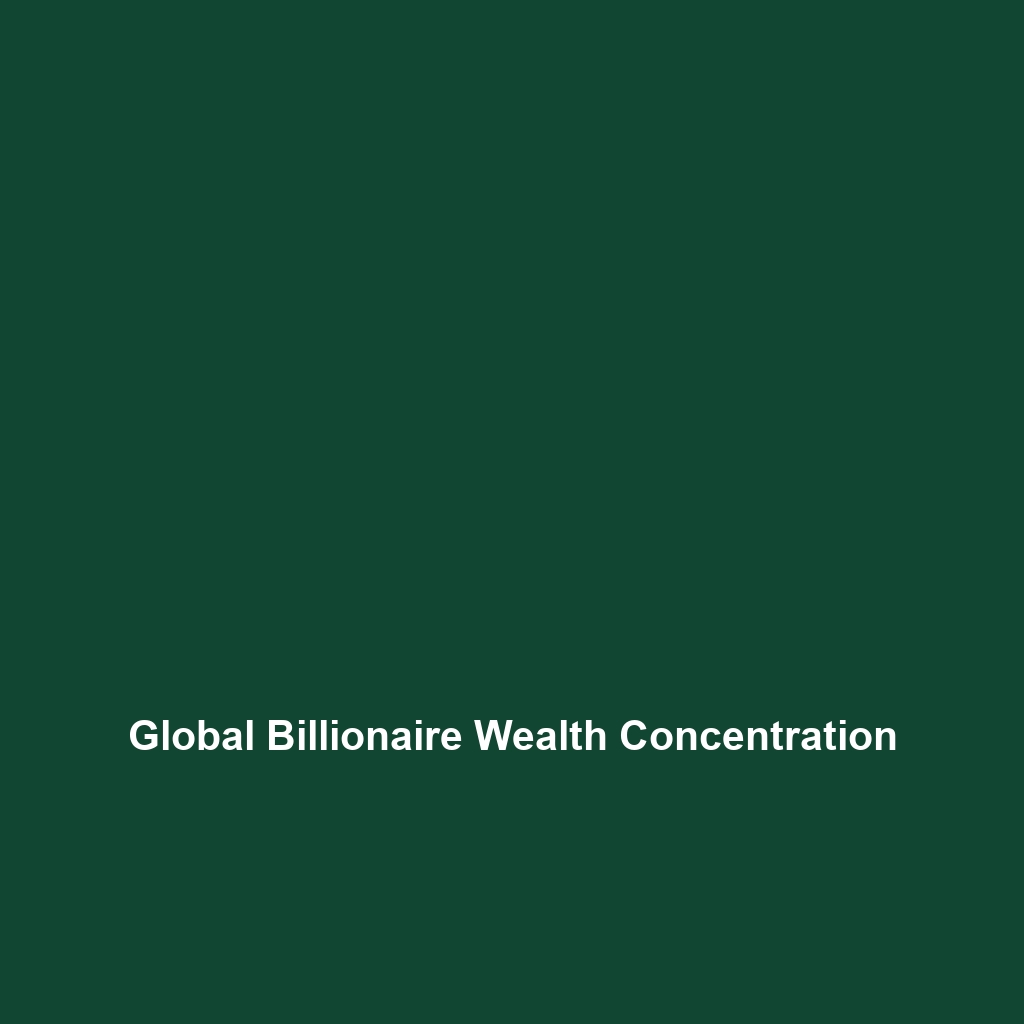Your cart is currently empty!
Tag: Equity and Justice

Global Billionaire Wealth Concentration
Global Billionaire Wealth Concentration
Global Billionaire Wealth Concentration
As of 2023, the world’s wealth is increasingly concentrated in the hands of a small number of individuals, with the 18 richest billionaires controlling an astounding $2 trillion. This figure accounts for approximately 16% of the total global billionaire wealth, highlighting a significant trend in wealth inequality that continues to grow.
Understanding Wealth Concentration
The phenomenon of wealth concentration has been an area of significant concern among economists and social scientists. According to a report from Forbes, the total number of billionaires worldwide reached a staggering 2,640 individuals in 2023, with a combined wealth of over $13 trillion. Amid this vast wealth, the top-tier billionaires display dominance that is both remarkable and alarming.
The concentration of wealth is not a new issue; it reflects ongoing shifts in the global economy, with technology, finance, and healthcare being key sectors that have fueled this growth. Billionaires like Elon Musk, Bernard Arnault, and Jeff Bezos lead the list, with net worths exceeding hundreds of billions, further solidifying their grip on global wealth.
Analyzing the Data
According to the OECD, wealth inequality has been exacerbated by various factors, including tax policies favoring the wealthy, technological advancements that reward capital over labor, and the globalization of markets. A report by Oxfam highlights that the richest 1% of the population have seen their wealth grow more than double that of the bottom 50% combined over the past decade.
The financial divide is not merely a statistic; it impacts socioeconomic structures globally. Wealth concentration affects access to resources, education, and healthcare, ultimately perpetuating a cycle where the rich get richer while the poor struggle to make ends meet.
The Role of Technology
Technological advancements have played a crucial role in the wealth accumulation of billionaires. The rise of the tech economy has produced massive fortunes for individuals in the technology sector. For instance, the surge in demand for digital products and services during the COVID-19 pandemic has disproportionately benefited technology billionaires.
Moreover, the increasing automation of jobs and the shift to online services have created a growing rift in income distribution. As companies scale, their owners and top executives reap the biggest rewards, often at the expense of the average worker.
Expert Opinions on Wealth Inequality
Experts in economics, such as Thomas Piketty, author of “Capital in the Twenty-First Century,” argue that unchecked wealth concentration poses a threat to democracy and economic stability. Piketty advocates for progressive taxation as a method of wealth redistribution, suggesting that the wealthy should contribute more significantly to social services that benefit the broader population.
In line with Piketty’s views, Joseph Stiglitz, a Nobel Prize-winning economist, has highlighted the importance of addressing these inequalities. He posits that policies aimed at improving education and healthcare access are essential to reducing wealth disparities and fostering economic growth.
Policy Measures and Solutions
Various countries have initiated or proposed policy measures aimed at combatting wealth inequality. For instance, some nations are considering wealth taxes as a means to ensure that the richest individuals contribute more to society. In 2021, countries participating in the OECD negotiations discussed mechanisms for global cooperation on corporate taxes, aiming to hold multinational corporations accountable for fair tax contributions.
Additionally, social enterprises and non-profit organizations are becoming more vocal in advocating for sustainable practices that prioritize equitable distribution of wealth. These initiatives aim to create systems that elevate marginalized communities and provide them with opportunities for economic development.
Conclusion
The concentration of wealth among the world’s billionaires raises critical questions about equity, justice, and sustainability in the global economy. With the 18 richest individuals controlling such a significant portion of billionaire wealth, the implications for broader societal structures cannot be understated. As wealth inequality persists, the need for effective policy responses becomes increasingly urgent.
Continuing discussions around wealth redistribution, tax reform, and corporate accountability are essential as policymakers, economists, and society at large seek pathways to a more equitable future. Addressing these issues requires a collective effort to ensure that wealth serves not just the privileged few but by extension supports vibrant, thriving communities worldwide.